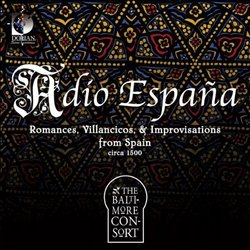| All Artists: Sephardic Traditional, Diego Pisador, Diego Oritz, Francisco de la Torre, Alonso de Mudarra, Christmas Traditional, Cancionero de Palacio Anonymous, Pedro Guerrero, Juan del Encina, Miguel de Fuenllana, Cancionero de Upsala Anonymous, Galician Traditional, Baltimore Consort Title: Adio España: Romances, Villancicos & Improvisations from Spain, Circa 1500 Members Wishing: 2 Total Copies: 0 Label: Dorian Recordings Original Release Date: 1/1/2009 Re-Release Date: 4/28/2009 Genres: Dance & Electronic, Special Interest, Pop, Classical Styles: Vocal Pop, Opera & Classical Vocal, Chamber Music, Historical Periods, Classical (c.1770-1830) Number of Discs: 1 SwapaCD Credits: 1 UPC: 053479090126 |
Search - Sephardic Traditional, Diego Pisador, Diego Oritz :: Adio España: Romances, Villancicos & Improvisations from Spain, Circa 1500
 | Sephardic Traditional, Diego Pisador, Diego Oritz Adio España: Romances, Villancicos & Improvisations from Spain, Circa 1500 Genres: Dance & Electronic, Special Interest, Pop, Classical
|
Larger Image |
CD Details |
CD ReviewsA Satisfying Collection of Spanish Renaissance Music MusicMan465 | USA | 09/12/2009 (3 out of 5 stars) "If you think about historic recreation, you'll undoubtedly think of today's popular Renaissance Faires. In music, such dedication to historic reproduction is to be found in recordings and performances by early music ensembles, such as The Baltimore Consort, one of the finest groups of musicians in the U.S. whose passion music of the Medieval, Renaissance, and early Baroque periods. In their new Dorian Recording entitled Adio España, The Baltimore Consort unveils 25 Renaissance gems from 15th-16th century Spain. In The Baltimore Consort's well-curated program, there are several types of works recorded of Christian, Jewish, and Moorish origin, from all regions of the Iberian peninsula: simple Sephardic melodies (folksongs with minimal accompaniments); instrumental dances or improvisations - for lutes, viols, wind instruments, vihuelas (early Spanish guitars), and percussion; and secular folksongs and dances - or cancioneros, often classified into two categories - romances (poetic ballads) and villancicos (livelier, often heroic songs and dances with refrains). Just as you might enjoy a Renaissance Faire without being a rabid historian of the period, it can be fascinating to just experience this music without reading any historical notes. One can clearly hear the distinctive seeds of Spanish musical style in these old works. However, the succinct, informative historical notes enclosed in this CD, as well as the excellent translations of lyrics, provide an increased level of understanding and enjoyment, like taking a tour through a Spanish museum with an expert. The romances and villancicos are particularly well chosen, found often in related pairings that complement each other. Several of the finest sets were composed by Juan del Encina, considered the most prolific and popular master of cancioneros from the Ferdinand-Isabella era. Among several anonymous works, a few singular works by various composers, six of Encina's works are featured, along with four colorful improvisations by Diego Ortiz. Brazilian countertenor José Lemos' guest vocal performance throughout the recording is a definitive highlight, with polished singing befitting the varied enchanting, heroic, and occasionally saucy lyrics. You may snicker a bit at lines such as "Be sure to satisfy your wife yourself / Cuckoo, cuckoo, cuck-cuckoo / Be careful not to be one," as I did, but if I had to choose a favorite track, it would be Lemos' haunting, fado-like performance of Tu Madre Cuando Te Parió in which he sings an especially touching Spanish refrain, translated "Farewell, farewell beloved / I no longer wish to live / You made life bitter for me." Also worth hearing is vibrant vihuela/guitar playing from Mark Cudek, one of the founding leaders of the consort. The technical production causes the CD to suffer slightly from occasional unevenness of balance, with some vivid percussion parts pushed further into the background than necessary, and an occasional microphone so close to a wind instrument to capture its player's deep consumption of breath, as well as their dominant presence in the sound of the ensemble. Overall, advocates and fans of early music should find The Baltimore Consort's collection a satisfying journey through Spanish Renaissance music history. " Spanish whirl felicitaz | NY, USA | 03/07/2010 (5 out of 5 stars) "I had the double pleasure of hearing this concert in person and now having many of the pieces on CD. (Every time I attended a BC concert, I'd nag them, "When is Romances & Villancicos coming out?") Baltimore Consort's verve & dramatic flare is in every piece here, though my particular favorites are 'Oy comamos y bebamos: Oy comamos y bebamos', 'Morena me llaman: Morena me llaman', 'Ríu, ríu, chiu: Ríu, ríu, chiu', and the haunting 'Una sañosa porfía: Una sañosa porfía'--a lament of the Spanish Conquest, from the perspective of the defeated Moorish king. Jose Lemos' voice richly glides from mood to mood. If you ever have a chance to hear him in concert, don't fail to do so--he sings with immense charm and intimacy, and you will feel he is singing just to you. I definitely recommend this collection to anyone who enjoys music of the Renaissance, and especially those who appreciate this exotic branch of the music of the period."
|

 Track Listings (25) - Disc #1
Track Listings (25) - Disc #1